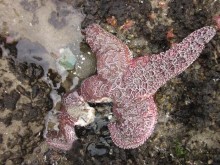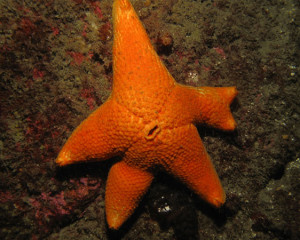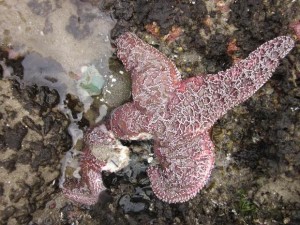Puget Sound Recovery Caucus proposes bill to find solutions to sea star wasting syndrome and other marine disease emergencies
— from the Office of Congressman Denny Heck —
To address the sea star wasting syndrome and other major marine disease emergencies, this week Representative Denny Heck (WA-10) and the Puget Sound Recovery Caucus introduced the Marine Disease Emergency Act. The proposed legislation would establish a framework for declaring and responding to a marine disease emergency, and to provide the science community with the resources to proactively protect marine ecosystems from being irreparably damaged by cascading epidemics.
The Marine Disease Emergency Act establishes a declaration process for the Secretary of Commerce, acting through the Administrator of NOAA, to declare a marine disease emergency. The proposed bill outlines the factors needed for a 120-day rapid response plan, including the necessary engagement of individuals and entities at federal, regional, state and local levels to assist in a coordinated and effective response aimed at minimizing the impacts and preventing further transmission. The legislation also requires a post-emergency report detailing current disease status and providing recommendations for improving responses to future marine disease emergencies.
The Marine Disease Emergency Act establishes a national data repository to facilitate research and link different datasets from across the country, as well as a “Marine Disease Emergency Fund” under Treasury in order to accept donations from the public and the industry.
“Sea stars do not function underwater in a vacuum,” said Representative Denny Heck, who represents the South Puget Sound area. “They are in fact a keystone species vital to the ecosystem. When these species face an epidemic, we must engage the scientific community in an organized, rapid-response approach to determine what can be done to halt the damage to our oceans. This could be a sign of a deeper problem.”
Professor Drew Harvell of Cornell University, who studies the ecology and evolution of coral resistance to disease, expressed support for the new policy, saying “Disease outbreaks of marine organisms are predicted to increase with warming oceans and so it’s very welcome to see legislation like the Marine Disease Emergency Act introduced.”
“When you pierce the surface of our picturesque water vistas, what’s underneath is not OK. We have sea stars that are wasting away, pulling themselves apart and limbs disappearing from their bodies. That is not OK. And it’s only getting worse,” said Sheida Sahandy, executive director of the Puget Sound Partnership. “We need the ability to respond to these kinds of emergencies as quickly as we would an earthquake or a hurricane. This action creates the support for the kind of nimble response that is required in order to react to fast-acting threats to our ecosystem.”
Representatives Heck and Kilmer co-founded the Congressional Puget Sound Caucus last year to reflect their commitment to preserving the Puget Sound. The caucus is the only Congressional working group devoted exclusively to promoting Puget Sound cleanup efforts, and builds on the legacy left by former Congressman Norm Dicks, a longtime advocate for the health of the Puget Sound. The caucus continues to be focused on promoting the three region-wide Puget Sound recovery priorities: preventing pollution from urban stormwater runoff, protecting and restoring habitat, and restoring and re-opening shellfish beds.
**If you are reading theOrcasonian for free, thank your fellow islanders. If you would like to support theOrcasonian CLICK HERE to set your modestly-priced, voluntary subscription. Otherwise, no worries; we’re happy to share with you.**











FYI: For all you critical thinkers out there: We must consider the Fukushima nuclear disaster as a potential cause to all the marine life die-off all along the West Coast of North America, and indeed, the whole northern Pacific Ocean.
Think For Yourselves!
And now visualize (or pray) all the waters on the world back to sparkling gem purity in beautiful light! You Can Do This!
It is called Manifestation! Love this world with your heats back into wholeness, it is the only way now.
Blessings, D.